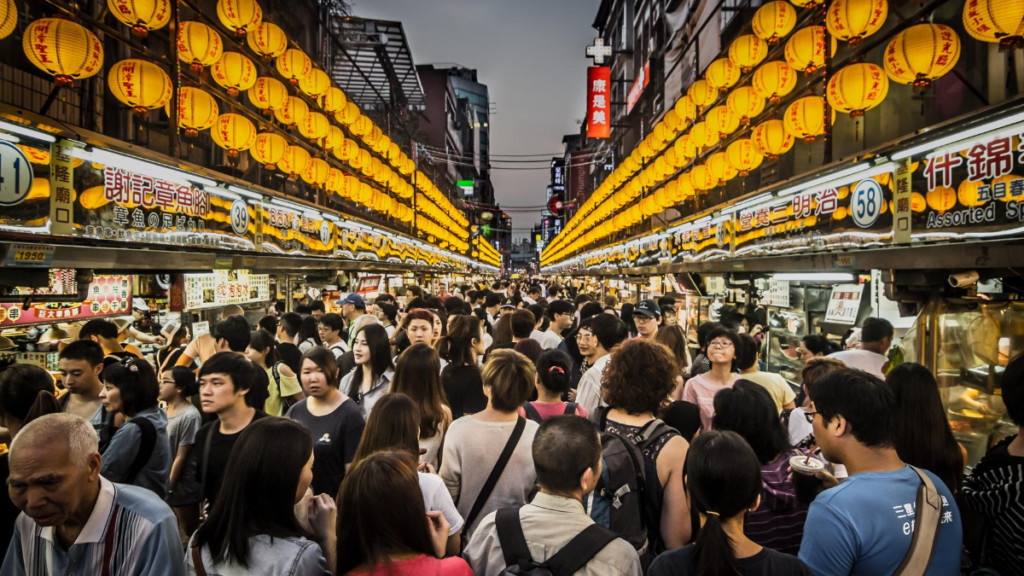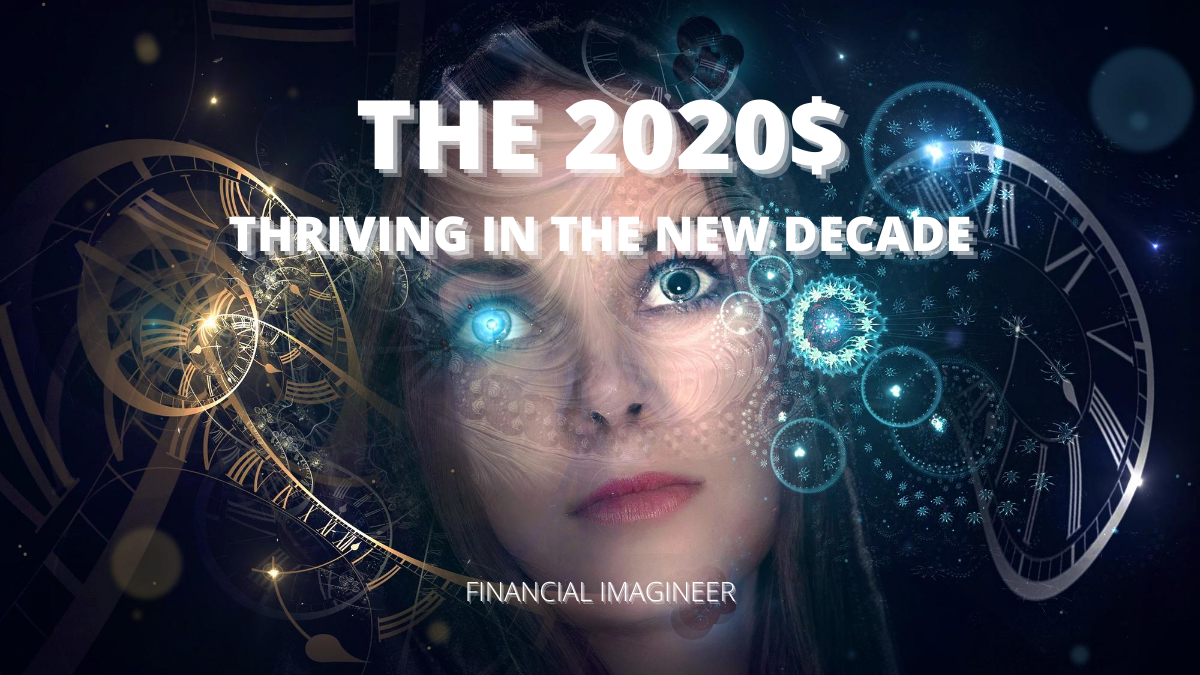The speed at which our world turns is accelerating: Ongoing technological disruption, tumultuous politics and a workplace that is “always-on” are leaving many of us out of breath. The coronavirus is adding further fuel into this rapidly changing field.
Let’s stay optimistic though: Change usually comes with opportunity. Humanity has gone through multiple shifts in culture, economic systems and politics in the past. If you look back, it’s clear that change is the only constant in history. We’re still at the beginning of a new decade.
Upcoming changes and trends will impact many aspects of our lives. No matter where you live. No matter what you do. No matter who you are. Use the current pandemic situation to slow down, lean back, reflect, and try to look forward – through the smoke and noise.
Looking forward is important.
Besides finding your Ikigai and building multiple income streams, focus on the road ahead and try to anticipate how YOUR life could be impacted by new trends and how to best prepare for them.

Recession proof your life.
Screw surviving, it’s time to thrive!
1. Get Ready to Fight For Your Job
Less than a year ago, we could never have imagined how a pandemic could impact our work environment. While office workers are currently enjoying an increase of time flexibility due to covid, there are more forces on the move behind the scenes.
During the corona lockdowns we could observe across our Linkedin, Facebook and other social media channels how the new found location and time freedom got celebrated. No more wasted time in commutes, traffic-jams, boring meetings and in general a higher quality of daily life.
More work has been done from home and less physical time spent around your office.
Productivity actually increased during that time! People feel more empowered, contribute more and as performance is monitored in terms of achieving your goals and co-workers that used to score high on working long hours are suddenly no longer relevant.
This is a double-edged sword in many ways.
Going forward, even, and especially after corona, I’d say that flexible work will no longer just be an extra perk offered to a few selected employees. It’ll be the one big demand from the workforce in this new decade.
Even before the pandemic, there have been experiments with reduced working hours such as a four-day workweek in Japan and by Microsoft. The surprising findings confirmed what we observed most recently: Reduced worktime doesn’t hurt results. Quite the opposite is the case as management can focus more to understand who delivers what.
Increased time and location flexibility is on the rise.
This is the good news.
The other side of the story is striking once you change your perspective: Since you don’t need to be in the office, your work, your job can be done by anyone with the necessary skills – from anywhere! This is not true for all, but for many fields. Why would management continue to pay a high cost worker in a high cost of living country if the same job can get done by someone abroad – virtually?
The world is flat.
In other words, a vast amount of work can be outsourced and “jobs” in high cost areas will be at risk the most. Your added value counts more than ever. Beware of your bottom line contribution. It got so much easier to track results and contribution. Companies will focus even more on increasing “productivity per worker” or “productivity per dollar spent” going forward.
Be worth your money.

In a first round, work-to-be-done will be outsource to the increasing skilled workforce in more cost-efficient locations. The second round will conclude by having work streamlined even more and supported by better tools, systems, artificial intelligence and ultimately executed by robots.
This trend has started already during the last decade, but my best guess is that the recent pandemic situation will accelerate it manifold.
The challenge or opportunity to thrive here to manage this well and make the best out of it.
Conclusion
Since the current pandemic made not having to go to the office the new normal, your presence time or time in the office no longer counts. All what truly counts are your contributions, results and THAT you got your work done in time. Beware on which parts you ADD VALUE. Focus on the part of work that is not easily outsourced. Increase your skills in the relevant niche.
New competition is on the rise: Get ready to fight for your job – or work!
Winners:
People who are good at “working independently”, who know how to add value and who are worth their money. IT savvy people who are freelancing and already know how to sell themselves online. Bloggers or people with a visibility on social media channels. It no longer matters to live nearby your company or close to your customers. You may as well be selling your services from Bali, Iceland or New Zealand. As long as you deliver: You will get paid. Geographic arbitrage opportunity at its finest!
Losers:
Workers that simply focus on selling “their time” or “office politics” can be easily replaced by remote workers from other (cheaper) countries. As less people commute, office space rentals and linked businesses will get hurt. This trend will ultimately also affect the current tax revenue pool of cities and countries with a high-income population and the residential real estate they currently occupy.
2. Global War for Attention and Eyeballs
Are you sometimes mindlessly scrolling through your Facebook or Twitter feed? Do you sometimes forget how you got there in the first place? You’ve been caught – and: You’re not alone! Social media, the internet and in general businesses have gotten so good in “catching your attention”.
As consumer, YOU are now the product. Eyeballs and audience is the new currency of the 21st century.

The habit of wasting away at least one hour of your day on social media is costing you your true potential! You’re pulled away from focusing, be it at work, at home or in your family. If you figure out how to focus despite all the ongoing distractions, you’ve won half the battle already on this trend!
Likewise to social media, the most challenged field is how we watch TV.
Honestly, even during covid, how many hours of TV can you possibly watch? Well, eventually not enough! 2020 was scheduled to be the year more money would be spent on original scripted TV than was spent in the whole decade of the 1990’s.
If you believe the TV-age is the past, you might be wrong.
This year Apple and Disney launched their services to compete and catch-up with established streaming players such as Netflix, Amazon and Hulu. More, such as HBO Max, Peacock (NBC) and Quibi are to follow in 2020. Netflix used to be the “only game in town” and now, suddenly, we’re hosting the streaming Olympics!
It’s contenders are the most creative, well-resourced companies on this planet and they have one thing in common: They all want your eyeballs (!) and a chunk of this growing business.
While Netflix still has first-mover advantage – our own family TV does have a Netflix button on the remote control – Apple, Amazon and Disney are catching-up and they’ve created a whole ecosystem where streaming is just one potential contact point for clients.
Your attention can be sold in many ways!
These giants are boosting monetization opportunities such as amusement parks, action figures, iPhones or Amazon Prime deliveries. Smaller players on the other hand will have to pay the big guys a toll to reach the end-clients’ attention – and devices.
Conclusion
Your eyeballs and attention are the new currency of the 21st century. There’s just THAT much attention to be sold. The streaming wars are about to get bloody. There will be casualties. During the first few month of the Corona-pandemic most tech companies have grown over proportionately. Beware how regulators could become increasingly critical in this field.
Winners:
People who learned how to retain their focus and know how to control their tech. The cash-flow-rich strong social media and streaming corporations that are well prepared to “milk” the market going forward. People with a unique skill to capture the attention of masses online.
Losers:
Individuals with a more passive approach to life. The more traditional TV and content channels. Newspapers without online strategy.
3. Lifelong Learning: AI, Technology and Reskilling the Workforce
There are many predictions about how robots and AI are about to take over our jobs. We don’t seem to spend sufficient time thinking about how people will thrive in this new reality and what kind of skills can’t be replaced by the new “threats”. The best answer so far was usually UBI – universal base income.
My view is that you need to level-up your skills and prepare yourself to be flexible. Did you know that 6 out of 10 students will be doing jobs that don’t exist yet today? How then can schools and universities prepare the next generation workforce to match the bill? How much will your degree, your MBA still be worth in the future?

My best answer: YOU got to learn – how to learn!
Simple as that.
Independent lifelong learning will have to become ingrained in our society. We will have to remain flexible and adapt to a faster changing environment. The best way to do this is to make learning fun and part of everyday life.
It’s actually amazing that we have the internet! You can access our combined global knowledge online. Anytime. From anywhere. It’s up to each one of us what to do with such remarkable power at our fingertips. Don’t let it go to waste and learn how to use it well.

With an ever-increasing proportion of global business volume being transacted over the internet, online or through apps, Ed-tech will become more important. If you want, you can access (free) online classes from Harvard – today!
There are countless online resources you can tap into – for lifelong learning. Countless blogs, podcasts, youtube channels to online courses are offered – we are being overwhelmed by an increasing offer of “knowledge” trying to get our attention.
It also doesn’t matter anymore where you grew up or currently live as this knowledge is available across borders and languages. Knowledge is being democratized. Again: The world is flat.
This can sound scary but it’s an amazing fact of early 21st century life.

For us as society there seem to be three ways to go about the issue:
1. leave education and upskilling it to the individual – the good ones will take care of it, empower themselves, get contracted and can earn something,
2. leave it to companies and hope for them to invest in keeping their talent on the payroll and up to date – expensive and what if talent leaves? Isn’t it more expensive if they don’t invest in their talent and they stay? Hmmm… or
3. let governments take care of it.
Conclusion
My conclusion here – and good news for people – as a resource – is: People are the most flexible in the above equation. They can cross borders and companies. Companies can also cross borders – to find talent, opportunity, or a better ecosystem but people might not necessarily follow. Last but not least, countries will be left behind. Hence, the pressure is on them – the countries – to prepare for this challenge. If they don’t, an increasingly globalized workforce and ever stronger large corporations will abandon them if not attractive enough. Countries must focus on keeping their laws competitive, their location attractive and their borders open for good companies and skilled labour.
The challenge or opportunity for you as individual is to stay relevant and potentially start to market yourself online. No joke that I call websites “21st century real estate”. You can build your online presence through a blog, a podcast, youtube, social media or many other ways. My friend Pete even built a whole business servicing people looking to catch-up with the respective new skills, it’s called Do You Even Blog/ Online Impact.
Winners:
The winners will be the flexible people, eager to learn, grow and adapt to the new realities. Keep building your knowledge and skillset as worker. If you look at it from the business side, anything that you can teach to the world becomes marketable. With that, services that help people acquire new skills to thrive in the new digital economy (e.g. Do You Even Blog). Large international corporations are also profiting by being able to tap into a larger pool of global talent at reducing costs. Universities with a strong, maybe even global reputation, will be able to profit from this trend as they can leverage their online resources to an increasing number of students. The winner takes it all.
Countries that embrace these challenges and offer the best possible ecosystem might be able to attract flexible individuals and corporations.
Losers:
The first ones to lose will be traditional suppliers of education that are not adapting fast enough or can’t compete with global education brands pushing through into new markets. People who are not curious or eager to keep building their knowledge and skills will be left behind quickly.
Countries, or “national states” that are going down the road of protectionism instead of embracing change by improving their ecosystem to attract more global talent and companies.
4. Climate Change and Real Estate
The whole corona situation seems to delay this issue – for now. Just last year, Greta Thunberg has been made person of the year by the TIME magazine, alongside her efforts, public pressure around the climate crisis ratcheted up in a way very few people anticipated.
Now, the countdown for 2030 begins. In this decade, 184 countries – all of us – must make good on the emission reduction commitments in order to maintain global temperature rise below 2°C. As the original pledges are not being met, activists are asking for a target reduction on paper to 1.5°C in order to correct the trajectory.
In a way, I do hope that one day we can look back at this time – the onset of a new decade – where we’ve decided to fight the threat of climate change and achieved to avoid it. We have done it before with the ozone layer, current forecasts project the layer might be fully healed by 2060. For me, the healing of the ozone layer is proof that we must listen to science, implement some rules and act before it’s too late.

The greatest threat to our planet is the belief that someone else will save it. We don’t have a “planet B” quite yet, don’t we? Elon Musk is working on it though! Space exploration will be another beneficiary of this trend.
Conclusion
Covid seems to have put the climate change movement on hold for the time being. There’s hope some of the issues can be resolved by the pandemic itself – such as lesser flights, less traffic, more frugality in general. It remains to be seen how this shall turn out once we figured how to live with/ or get rid of covid.
Climate change will have lasting impact on exposed locations or countries. Mass migrations could happen again. Real estate and insurance premiums will be affected. Increased risks for storms, floods, fire or shifting economic centers will be the driver. Keep the insurance and re-insurance business in view here, they might be significantly overexposed and under covered especially in these times of low interest rates.

Winners:
Companies that produce more sustainable products and services. Potentially electric vehicles, more eco-friendly planes, sustainable energy, just to name a few. Countries that are less affected by potential global warming impacts (think Iceland, New Zealand). Location independent people.
Losers:
Companies that will not adjust their strategy to the new situation and changing demands fast enough. Countries that are more affected by climate change. People who are not able or flexible to move if necessary.
5. The Asian Century will Dawn
In 2020, Asian economies will be larger than the “rest of the world combined” for the first time since the 19th century. Further, Asia is now home for more than half of the worlds middle class. The worlds economic center of gravity has been on the move for a few years already. Most recently it moved from the middle of the Atlantic slowly eastwards and should be ending up somewhere in Southern China a few years down the road.

Of course the transition and “uprise” will not be a quiet and stable one, tensions in the Far East and protests could slow down this trend. However, from an economic and demographic perspective, it’s bound to turn out this way: Asia will be the focus of the next decade.
China and India had stellar growth and managed to pull out as many people from poverty as never been seen in human history before. China alone moved more than 800 million people (!) out of poverty – right into middle class. Once this transformation is completed, the question will be: What’s next?

Asia is not just China, there are many more countries currently emerging.
Conclusion
It remains to be seen what exactly the turnout will be on this one. Politics will be key driver here. See the trade wars that have started already.
Winners:
Corporations and businesses focusing on a growing middle-class in Asia.
Losers:
Corporations that keep focusing on their current slice of the market and don’t spend any time or effort to grow alongside this growing economic cake.
6. Meat Alternatives will go Big
Meat alternatives are growing into the hearts of consumers. The Impossible Whopper, Beyond Meat (now on Pizzas, in spaghetti sauce and in burgers as well) and more new contenders will be forming a whole new category of food in direct competition to traditional meat farming.

In my family we recently tested pure “Angus Beef Burgers” versus “Beyond Burger” in a blind testing set-up. My kids preferred Beyond. Most likely their burger was made to smell, taste or feel better than a burger by design. So, yes, meat alternatives won in our home-own blind tasting!

While the target market is growing fast – some consumers want to enjoy their protein and believe to do good to switch to ecologically and ethical better solution – the agricultural industry is on the move and plans to impose new laws restricting the use of words such as meat, burger, milk or animal products. Proposals of that kind have been pushed before the U.S. Congress and the European Commission already.
The market at stake is huge: an annual USD 140 billion by the end of the decade!
The game-changer for the next 10 years will be the arrival of cultured, slaughterless meat. Beef, pork, chicken and more that grows in labs from animal cells. Everyone in this business is watching closely for breakthroughs. Key for success will be the labelling and selling it the right way.
To succeed, alternative producers want and need their products to be found in – or near the meat aisles, the meat counters, and the respective restaurants. The target client is no longer the vegan or vegetarian but everyone, including and especially the meat eater. If the most convinced meat eater moves his consumption their way, they’ve won.
Conclusion
This trend has started and can be compared to what happened with banning smoking from restaurants, public spaces and offices in the past 20-30 years, imagine what could happen if eating/ consuming (real) meat could get publicly shamed.
Let’s see. I have tried Beyond but still prefer a good steak, burger and sausage myself.
Winners:
Producers of healthy, tasty and affordable [meat] alternatives.
Losers:
Companies that ignore this trend.
7. Capitalism – Quo vadis?
Capitalism as we know it will be contested. Ray Dalio, a hedge fund manager and US billionaire sees this as the biggest threat in the 2020’s, he says “the world is approaching a big paradigm shift”. The historic money printing that came with Corona is actually speeding up this potential shift.

Capitalism is and will remain the one system to guide economic activity on our planet that works best. However, it seems recently more voices are sending the message that pure capitalism does not work anymore for everyone. The true problems come from targeting never-ending growth, increasing inequality and new technologies such as artificial intelligence and robotics could actually even be a catalyst to speed-up inequalities. Corona helped further.
In late 2020 the IMF will hold again its SDR basket rebalancing meeting, a meeting that is held just every 5 years and decides how much weight our largest global currencies will get for the subsequent 5 years. The last IMF SDR meeting was held in 2015, China was the big winner at the expense of the EU, Japan and the UK. Back in 2015 the US could protect its USD very well.
Conclusion
Capitalism and the system have never been “cast in stone”. It has evolved further through history. It will be interesting to anticipate the next moves, the 2020’s sure look like there’s huge potential for larger shifts in this field once again. Economists are currently concerned that traditional stimulative tools, such as interest rate cuts, bond-buying programs, more quantitative easing, will be less capable of spurring investment during this current Covid-recession.
If you’re planning for your future and or consider retirement, take care of these points. There could well be a retirement crisis coming up. Plan differently this time.
Winners:
Currencies of economies with lower quantitative easing, lower inflation, and lower debt levels. Potentially replacements for a global reserve currency, maybe new central bank issued digital currency. Equities with stable inflation protected businesses. Real assets such as real estate, gold, silver, and the respective miners. People with a sound retirement plan not just relying on governments help, cash or savings.
Losers:
Bond holders, currencies affected by the global power shift, currencies of countries that don’t adapt to the new global order fast. People that solely rely on government supports for everyday life or retirement needs.
8. Living, Breathing FIRE
As the new decade has started, the FIRE (Financial Independence/ Retire Early – or Retire to Entrepreneurship – or Recreational Employment) movement is still growing strong despite the Corona pandemic impact.
In fact, questioning the values of working and consuming evermore in search of happiness has never been more popular than now.
This trend is global.
In Europe, working hours are still being reduced. FIRE keeps spreading in the US. Even in the more work-obsessed cultures in Asia people started rebelling against the 9-9-6 model (working 9am to 9pm 6 days a week).
The more productive we become, the more we value time as scarcest resource of our life.
“Hunger” has always been a healthy component for progress and growth. Wouldn’t it be self-limiting for humanity if that part would be neutralized completely? On one side an absence of hunger may be caused by us attaining the well-deserved fruit of abundance while on the other side deeper concerns about capitalism itself are spreading.
The urge for change is usually the highest in direct relation with pain and uncertainty about the future. A good thing also that most of us have more time to think deep.
Getting aligned and making the best of what’s to come it to grow stronger is the way!
Conclusion
In my above attempt to filter through some trends the main question for you is:
“How do I future proof myself, or how do I even thrive through the 2020’s?”

My simple answer to this is to focus on your ikigai, work on skills instead of diplomas, keep learning, stay relevant by adding value, beware of new competition – and opportunities (the world is flat).
Start with self-branding, move towards self-employment and surround yourself with people who remind you more of your future than your past.
Screw surviving – it’s time to thrive!
Matt

Wow! Such an informative piece. Thanks for this!
Thanks for stopping by Nikhil, happy to read it helps you to thrive in the 2020$!
Interesting summary of the trends, chances, and risks that evolved during 2020/2021. I really liked your article! A lot of exciting assumptions. Thank you very much for sharing!
Maximilian
Dear Maximilian,
Glad you liked it, this was still pre-Covid, but I guess some of the things even accelerated now due to pandemic.
Cheers,
Matt